Unit 3 Teenagers should be allowed to choose their own clothes教案
- 格式:doc
- 大小:42.00 KB
- 文档页数:1
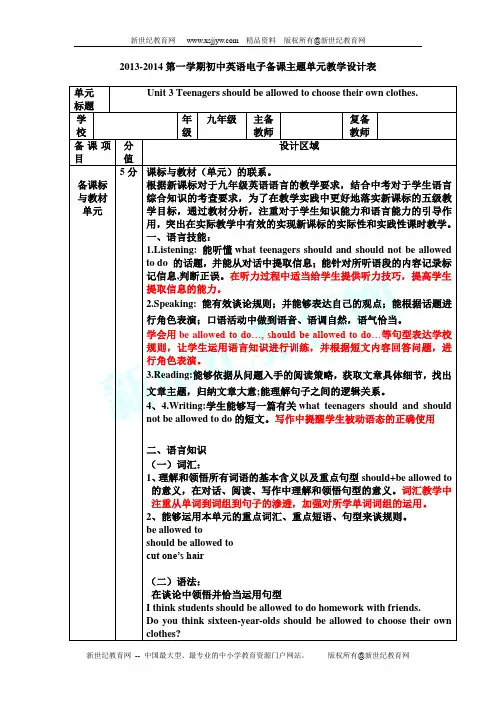
2013-2014第一学期初中英语电子备课主题单元教学设计表单元标题Unit 3 Teenagers should be allowed to choose their own clothes.学校年级九年级主备教师复备教师备课项目分值设计区域备课标与教材单元5分课标与教材(单元)的联系。
根据新课标对于九年级英语语言的教学要求,结合中考对于学生语言综合知识的考查要求,为了在教学实践中更好地落实新课标的五级教学目标,通过教材分析,注重对于学生知识能力和语言能力的引导作用,突出在实际教学中有效的实现新课标的实际性和实践性课时教学。
一、语言技能:1.Listening: 能听懂what teenagers should and should not be allowedto do 的话题,并能从对话中提取信息;能针对所听语段的内容记录标记信息,判断正误。
在听力过程中适当给学生提供听力技巧,提高学生提取信息的能力。
2.Speaking: 能有效谈论规则;并能够表达自己的观点;能根据话题进行角色表演;口语活动中做到语音、语调自然,语气恰当。
学会用be allow ed to do…, should be allowed to do…等句型表达学校规则,让学生运用语言知识进行训练,并根据短文内容回答问题,进行角色表演。
3.Reading:能够依据从问题入手的阅读策略,获取文章具体细节,找出文章主题,归纳文章大意;能理解句子之间的逻辑关系。
4、4.Writing:学生能够写一篇有关what teenagers should and shouldnot be allowed to do的短文。
写作中提醒学生被动语态的正确使用二、语言知识(一)词汇:1、理解和领悟所有词语的基本含义以及重点句型should+be allowed to的意义,在对话、阅读、写作中理解和领悟句型的意义。
词汇教学中注重从单词到词组到句子的渗透,加强对所学单词词组的运用。
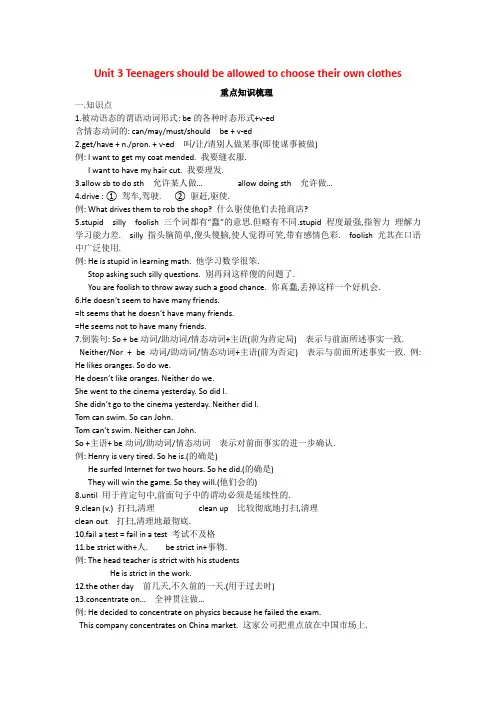
Unit 3 Teenagers should be allowed to choose their own clothes重点知识梳理一.知识点1.被动语态的谓语动词形式: be的各种时态形式+v-ed含情态动词的: can/may/must/should be + v-ed2.get/have + n./pron. + v-ed 叫/让/请别人做某事(即使谋事被做)例: I want to get my coat mended. 我要缝衣服.I want to have my hair cut. 我要理发.3.allow sb to do sth 允许某人做… allow doing sth 允许做…4.drive : ① 驾车,驾驶. ② 驱赶,驱使.例: What drives them to rob the shop? 什么驱使他们去抢商店?5.stupid silly foolish 三个词都有“蠢”的意思.但略有不同.stupid 程度最强,指智力理解力学习能力差. silly 指头脑简单,傻头傻脑,使人觉得可笑,带有感情色彩. foolish 尤其在口语中广泛使用.例: He is stupid in learning math. 他学习数学很笨.Stop asking such silly questions. 别再问这样傻的问题了.You are foolish to throw away such a good chance. 你真蠢,丢掉这样一个好机会.6.He doesn’t seem to have many friends.=It seems that he doesn’t have many friends.=He seems not to have many friends.7.倒装句: So + be动词/助动词/情态动词+主语(前为肯定局) 表示与前面所述事实一致. Neither/Nor + be动词/助动词/情态动词+主语(前为否定) 表示与前面所述事实一致. 例: He likes oranges. So do we.He doesn’t like oranges. Neither do we.She went to the cinema yesterday. So did I.She didn’t go to the cinema yesterday. Neither did I.Tom can swim. So can John.Tom can’t swim. Neither can John.So +主语+ be动词/助动词/情态动词表示对前面事实的进一步确认.例: Henry is very tired. So he is.(的确是)He surfed Internet for two hours. So he did.(的确是)They will win the game. So they will.(他们会的)8.until 用于肯定句中,前面句子中的谓动必须是延续性的.9.clean (v.) 打扫,清理clean up 比较彻底地打扫,清理clean out 打扫,清理地最彻底.10.fail a test = fail in a test 考试不及格11.be strict with+人. be strict in+事物.例: The head teacher is strict with his studentsHe is strict in the work.12.the other day 前几天,不久前的一天.(用于过去时)13.concentrate on… 全神贯注做…例: He decided to concentrate on physics because he failed the exam.This company concentrates on China market. 这家公司把重点放在中国市场上.14. more…than…①与其说…不如说…; 比…更…例: The man is more stupid than nervous.与其说那人紧张,倒不如说他愚蠢.②在这一结构中,more做adj. 修饰名词,表示“比…多”例:I have more books than you. 我的书比你的多.15.volunteer ① n. 自愿者. ② v. volunteer to do sth. 自愿做…例: We all volunteered to help in the old people’s home.我们都志愿到敬老院帮忙.16.chance 指侥幸的,偶尔的机会,还可表示“可能性”opportunity 指有利的时机,良机. 二者有时可以互换.Have an opportunity to do sth 有做…的机会.Don’t be too frustrated. You’ll have another opportunity to go to college next year. 别太沮丧了,你还有上大学的机会.17.experience : ①可数名词“经历,体验” 例: Please tell us something about your experiences.②不可数名词“经验” 例: He is a man of rich experience.③动词“经历” 例: She experienced lots of suffering.18. off 不工作,不上班,不上学,不值班.例: I think I’ll take the afternoon off. 我想下午歇班.She is off today. 她今天休息.I have three days off next week. 下周我有三天假.They haven’t had a day off since last week. 从上周来,他们没休息过一天.19. reply 与answer 两者有时可通用. reply比answer正式,一般指经过思考的.有针对性的,详细的回答,往往与to连用.answer是一般用语,可直接带宾语.另外answer还有“应答”之意.如answer the door/telephone20. get in the way (of)... 妨碍...例: He never gets in others’ way. 他从不妨碍别人.The bikes over there will get in the way of others. 自行车放在那里会妨碍别人的.21. success (n.) successful (adj.) succeed (v.)22. do does did 用在另一个动词前表示强调.例: He does speak well. 他真的讲的很好. Do be quiet. 务必安静.She did do her homework yesterday. 她昨天确实写作业了.23. in the end = finally = at last 最后.24. importance (n.) important (adj.)25. be serious about 对…热忠/极感兴趣.例: I’m serious about the problem.To tell you the truth, I’m not serious about math at all.26. only 处于句首,并后跟状语时,全句需要倒装.例: Only then did he understand it. 只有到那时,他才明白.Only in this way can we learn English well. 只有这样我们才能把英语学好.Only when she came home, did he learn the news. 当她到家时,他才得知了这消息.27. care about 关心,在乎,在意.例: No one cares about others nowadays. 现在没人关心别人.I don’t care about what he does. 我并不在意他干什么.28. clothes 统指身上穿的各种服装,包括上衣,裤子,内衣等,做主语,谓语动词按复数处理. clothing 不可数名词,是服装的总称,包括各种衣服,帽子,鞋袜等.做主语谓动按单三处理. cloth 布料.二.短语1. be allowed to do sth被允许干… allow sb to do sth 允许某人干…allow doing sth 允许干…2. sixteen-year-olds = sixteen-year-old boys and girls 16岁的孩子3. part-time jobs 兼职工作4. a driver’s license 驾照5. on weekends 在周末6. at that age 在那个年龄段7. on school nights 在上学期间的每个晚上8. stay up 熬夜9. clean up (相当与及物动词) 清扫10. fail (in) a test 考试不及格11. take the test 参加考试12. the other day 前几天13. all my classmates 我所有的同学14. concentrate on 全神贯注于15. be good for 对…有益16. in groups 成群的,按组的17. get noisy 吵闹(系表结构) 18. learn from 向某人学习19. at present 目前,现在20. have an opportunity to do sth 有做…的机会21.English-English dictionary 英英词典22. at least 至少23.eight hours’ sleep a night 每晚8小时的睡眠24. an old people’s home 敬老院25. take time to do sth 花费时间干…26. primary schools 小学27. have…off 放假,休息28. reply to 回答,答复29. get in the way of 妨碍30. a professional athlete 职业运动员31. achieve one’s dreams 实现梦想32. think about 思考,考虑33. in the end 最后,终于34. be serious about 对…热忠/极感兴趣35. spend…on + n. spend …(in) + v-ing 在…上花费时间/金钱36. care about 关心,担心,在乎37. agree with 同意…三.句子1. I don’t think twelve-year-olds should be allowed to get their ears pierced.我认为不应该允许12岁的孩子穿耳孔.2.They talk instead of doing homework. 他们聊天而不是做作业.3.He is allowed to stay up until 11:00 pm. 允许他们熬到晚上11点.4.We should be allowed to take time to do things like that more often.我们应该被允许更加经常的花些时间多做这类事情.5.What school rules do you think should be changed?你认为学校的哪些制度应该改一改了?6.The two pairs of jeans both look good on me. 这两条牛仔裤穿在我身上都适合.7.The classroom is a real mess. 教室太脏了.8.Should I be allowed to make my own decisions?9.Only then will I have a chance of achieving my dream. 只有这样我才能实现我的梦想.10.They should be allowed to practice their hobbies as much as they want.应该允许他们对业余爱好想练多长时间就练多长时间.。
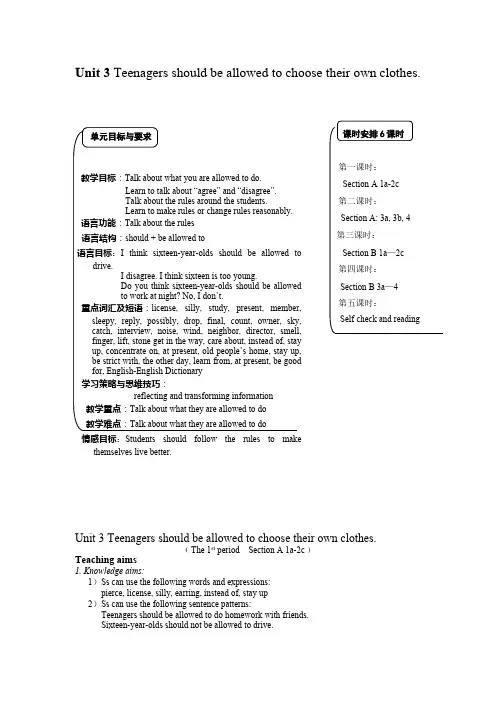
Unit 3 Teenagers should be allowed to choose their own clothes.Unit 3 Teenagers should be allowed to choose their own clothes.﹙The 1st period Section A 1a-2c ﹚Teaching aims1. Knowledge aims:1)Ss can use the following words and expressions:pierce, license, silly, earring, instead of, stay up2)Ss can use the following sentence patterns:Teenagers should be allowed to do homework with friends.Sixteen-year-olds should not be allowed to drive.themselves live better.Do you think sixteen-year-olds should be allowed to choose their own clothes?Yes, I do./ No, I don’t.2. Ability aims:Enable the Ss to use the sentence patterns to show their own opinions about rules and give reasons 3. Emotional aims:Let the Ss think about if their deeds are right or wrong as teenagers and students, let them know some necessary rules. Important and difficult points:Use “should (not) be allowed to…”to talk about rules.Unit 3 Teenagers should be allowed to choose their own clothes.(The 2nd period Section A 3a, 3b, 4)Teaching aims:1. Knowledge aims:1) Review what you are allowed to do as a teenager.2)Review how to talk about “agree” and “disagree”.3)Talk about the rules around the students.2. Ability aims: 1) Learn to talk about the rules they have to obey.2) Learn to make rules or change rules reasonably.3. Emotion aims: Enable the students to understand some strict rules they have to follow.Key points: Learn to talk about the rules they have to obey using “Don’t…” and “You can…”Difficult points:Make rules or change rules reasonably.Teaching tools: CAI, a tape recorder.教学步骤建议和说明Teaching steps:Step1. Revision1. T: Are you happy today? What did you do last night?Did you go out with your friends?What do your parents let you do at home?S1: My parents let me go shopping on Sundays.T: What is he/she allowed to do?S2: He /She is allowed to go shopping on Sundays. {Ask more Ss}T: What do your parents let you do at home? / What do your teachers let you do at school? S1: My parents / teachers let me …由平常的问候自然引入到本单元的话题,进而进行上节课句型以及新词的复习。
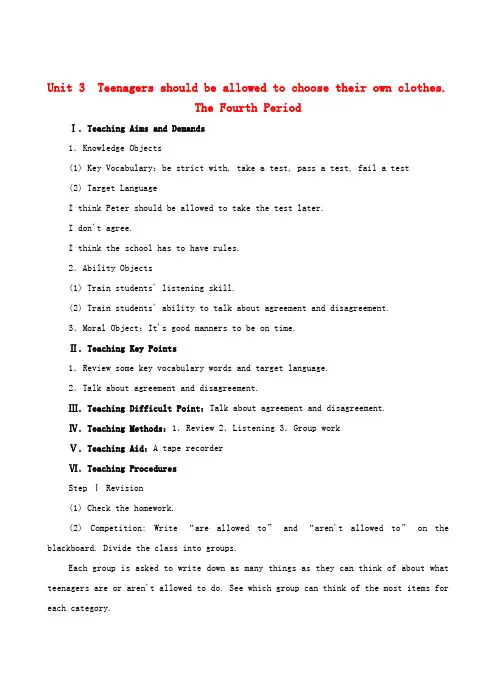
Unit 3 Teenagers should be allowed to choose their own clothes.The Fourth PeriodⅠ.Teaching Aims and Demands1.Knowledge Objects(1) Key Vocabulary:be strict with, take a test, pass a test, fail a test(2) Target LanguageI think Peter should be allowed to take the test later.I don't agree.I think the school has to have rules.2.Ability Objects(1) Train students' listening skill.(2) Train students' ability to talk about agreement and disagreement.3.Moral Object:It's good manners to be on time.Ⅱ.Teaching Key Points1.Review some key vocabulary words and target language.2.Talk about agreement and disagreement.Ⅲ.Teaching Difficult Point:Talk about agreement and disagreement.Ⅳ.Teaching Methods:1.Review 2.Listening 3.Group workⅤ.Teaching Aid:A tape recorderⅥ.Teaching ProceduresStep Ⅰ Revision(1) Check the homework.(2) Competition: Write “are allowed to” and “aren't allowed to” on the blackboard. Divide the class into groups.Each group is asked to write down as many things as they can think of about what teenagers are or aren't allowed to do. See which group can think of the most items for each category.Step Ⅱ 1aThis activity reviews the use of always, sometimes, usually and never.Point to the picture. Ask students to describe what is happening in the picture.Help students to say, The boy is late for class. Invite a student to read the four questions in the box to the class.Read the instructions and remind students of the exact meanings of the adverbs of frequency.Say, Please write A after things you always do, U after things you usually do, S after things you sometimes do and N for things you never do.Get students to finish the task on their own.Answers to this activity will vary.Step Ⅲ 1bThis activity provides oral practice using the target language.Point out the sample conversation. Ask a pair of students to say it to the class.S A: Do you ever get to class late?S B: Yes , I sometimes get to class late.Say, Talk with your partner about your answers in Activity 1a.As the pairs work together, walk around the room offering help if necessary.Ask several pairs to share their conversations with the class.Step Ⅳ 2aThis activity provides practice in understanding the target language in spokenconversation.Point out the four items in Activity 1a. Say, You will listen to a conversation and circle the things on the list that you hear. Play the recording for the first time. Students only listen.Play the recording a second time. This time students listen and circle the things that they hear.Check the answers:1, 4Step Ⅴ 2bThis activity provides listening practice using the target language.Point to both the numbered and lettered lists of item in the box.Point out the sample answer. Read the sentence “Peter is going to fail a math test to the class. ”Say, I'll play the same recording again. You are to match the sentence parts as you hear on the tape.Play the recording for students to do the activity.Check the answers:1.c 2.e 3.a 4.b 5.dStep Ⅵ 2cThis activity provides oral practice using the target language.Call students' attention to the statements in the box. Say them to the class.Ask three students to read the sample conversation to the class, completing the sentences.S A: I think Peter should be allowed to take the test later.S B: I don't agree.S C: I think the school has to have rules.Write the conversation on the blackboard.Divide the class into groups of four. Say, Now discuss the statements with your group.As the groups work together, walk around the room offering help as needed. Ask some groups to say a few lines of their conversations to the class.NotesParents should not be too strict with teenagers. Note the word be strict with.Generally speaking, we say be strict with sb. but be strict in sth. For example, Our teachers are strict with us. He is strict in his work.Step Ⅶ Summary and HomeworkSay, In this class, we've learned to talk about agreement and disagreement. And we've also reviewed adverbs of frequency. Have you ever been late for school? Write a passage to describe what was happening that day.Step Ⅷ Blackboard DesignUnit 3 Teenagers should be allowed tochoose their own clothes.Section BThe Fourth PeriodTarget language:A: I think Peter should be allowed to take the test later.B: I don't agree.C: I think the school has to have rules.。
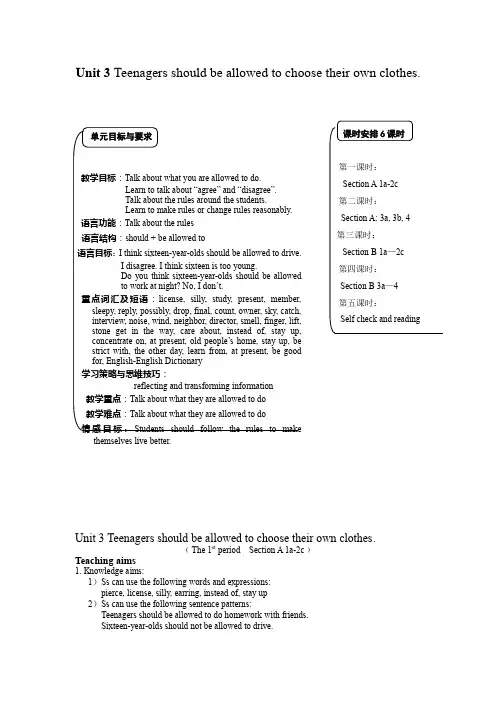
Unit 3 Teenagers should be allowed to choose their own clothes.Unit 3 Teenagers should be allowed to choose their own clothes.﹙The 1st period Section A 1a-2c﹚Teaching aims1. Knowledge aims:1)Ss can use the following words and expressions:pierce, license, silly, earring, instead of, stay up2)Ss can use the following sentence patterns:Teenagers should be allowed to do homework with friends.Sixteen-year-olds should not be allowed to drive.Do you think sixteen-year-olds should be allowed to choose their own clothes?Yes, I do./ No, I don’t.2. Ability aims:Enable the Ss to use the sentence patterns to show their own opinions about rules and give reasons 3. Emotional aims:Let the Ss think about if their deeds are right or wrong as teenagers and students, let them know some necessary rules. Important and difficult points:Use “should (not) be allowed to…”to talk about rules.Unit 3 Teenagers should be allowed to choose their own clothes.(The 2nd period Section A 3a, 3b, 4)Teaching aims:1. Knowledge aims:1) Review what you are allowed to do as a teenager.2)Review how to talk about “agree” and “disagree”.3)Talk about the rules around the students.2. Ability aims: 1) Learn to talk about the rules they have to obey.2) Learn to make rules or change rules reasonably.3. Emotion aims: Enable the students to understand some strict rules they have to follow.Key points: Learn to talk about the rules they have to obey using “Don’t…” and “You can…”Difficult points:Make rules or change rules reasonably.Teaching tools: CAI, a tape recorder.教学步骤建议和说明Teaching steps:Step1. Revision1. T: Are you happy today? What did you do last night?Did you go out with your friends?What do your parents let you do at home?S1: My parents let me go shopping on Sundays.T: What is he/she allowed to do?S2: He /She is allowed to go shopping on Sundays. {Ask more Ss}T: What do your parents let you do at home? / What do your teachers let you do at school? S1: My parents / teachers let me …由平常的问候自然引入到本单元的话题,进而进行上节课句型以及新词的复习。
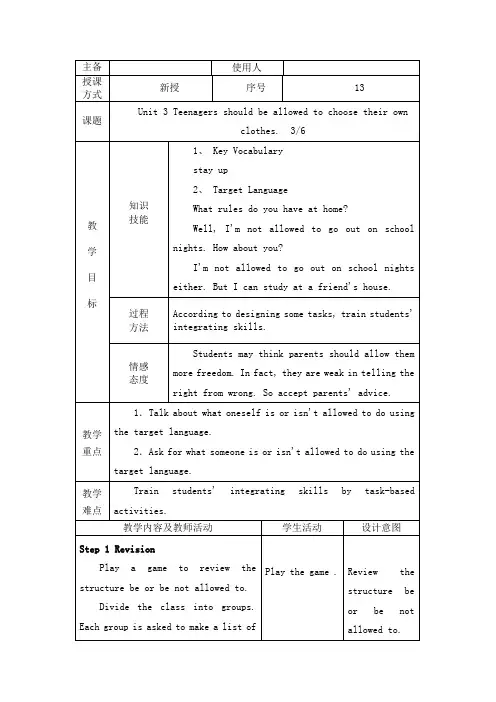
主备人 使用人 年级 授课
方式 新授 序号 13
课题 Unit 3 Teenagers should be allowed to choose their own clothes. 3/6
教 学 目 标
知识 技能
1、 Key Vocabulary stay up 2、 Target Language What rules do you have at home? Well, I'm not allowed to go out on school nights. How about you? I'm not allowed to go out on school nights either. But I can study at a friend's house.
过程 方法 According to designing some tasks, train students'
integrating skills.
情感 态度
Students may think parents should allow them
more freedom. In fact, they are weak in telling the right from wrong. So accept parents' advice.
教学重点 1.Talk about what oneself is or isn't allowed to do using the target language. 2.Ask for what someone is or isn't allowed to do using the target language. 教学难点 Train students' integrating skills by task-based activities. 教学内容及教师活动 学生活动 设计意图 Step 1 Revision Play a game to review the structure be or be not allowed to. Divide the class into groups. Each group is asked to make a list of
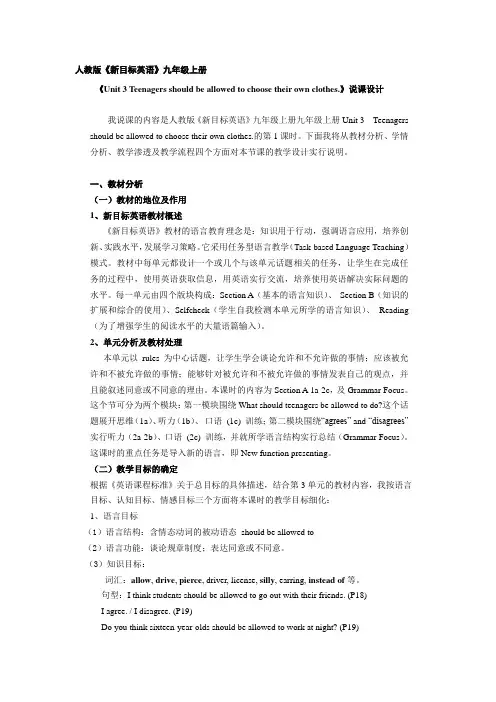
人教版《新目标英语》九年级上册 《Unit 3 Teenagers should be allowed to choose their own clothes.》说课设计
我说课的内容是人教版《新目标英语》九年级上册九年级上册Unit 3 Teenagers should be allowed to choose their own clothes.的第1课时。下面我将从教材分析、学情分析、教学渗透及教学流程四个方面对本节课的教学设计实行说明。
一、教材分析 (一)教材的地位及作用 1、新目标英语教材概述 《新目标英语》教材的语言教育理念是:知识用于行动,强调语言应用,培养创新、实践水平,发展学习策略。它采用任务型语言教学(Task-based Language Teaching)模式。教材中每单元都设计一个或几个与该单元话题相关的任务,让学生在完成任务的过程中,使用英语获取信息,用英语实行交流,培养使用英语解决实际问题的水平。每一单元由四个版块构成:Section A(基本的语言知识)、 Section B(知识的扩展和综合的使用)、Selfcheck(学生自我检测本单元所学的语言知识)、 Reading(为了增强学生的阅读水平的大量语篇输入)。 2、单元分析及教材处理 本单元以rules为中心话题,让学生学会谈论允许和不允许做的事情;应该被允许和不被允许做的事情;能够针对被允许和不被允许做的事情发表自己的观点,并且能叙述同意或不同意的理由。本课时的内容为Section A 1a-2c,及Grammar Focus。这个节可分为两个模块:第一模块围绕What should teenagers be allowed to do?这个话题展开思维(1a)、听力(1b)、 口语 (1c) 训练;第二模块围绕“agrees” and “disagrees”实行听力(2a-2b)、口语 (2c) 训练,并就所学语言结构实行总结(Grammar Focus)。这课时的重点任务是导入新的语言,即New function presenting。 (二)教学目标的确定 根据《英语课程标准》关于总目标的具体描述,结合第3单元的教材内容,我按语言目标、认知目标、情感目标三个方面将本课时的教学目标细化: 1、语言目标 (1)语言结构:含情态动词的被动语态 should be allowed to (2)语言功能:谈论规章制度;表达同意或不同意。 (3)知识目标: 词汇:allow, drive, pierce, driver, license, silly, earring, instead of等。 句型:I think students should be allowed to go out with their friends. (P18) I agree. / I disagree. (P19) Do you think sixteen-year-olds should be allowed to work at night? (P19) No, I don’t think so. 2、认知目标:掌握关键词汇和目标语言。 3、情感目标:学会谈论自己应该被允许做的事情和不应该被允许做的事情。学生勇于发表自己的观点和意见,表达同意和不同意;学生明白接受父母、老师的合理化建议,对他们成长的重要性。 (三)教学重点及难点的确定 重点: 1、如何使用 should be allowed to 结构表达自己对各种规章制度的看法。 2、表达同意和不同意。 难点:含情态动词的被动语态结构should be allowed to。
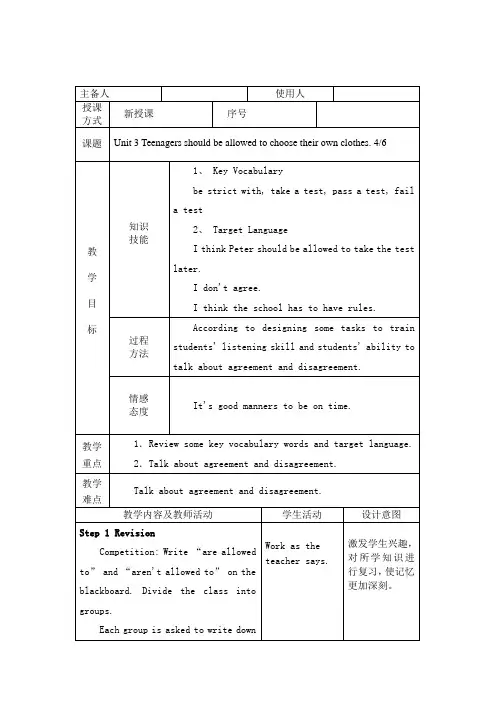
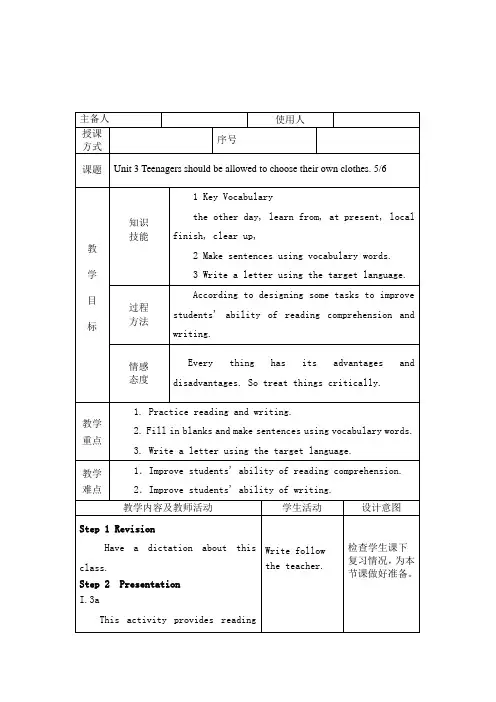
新目标英语九年级 教案 Unit 3 Teenagers should be allowed to choose their own clothes 教学目标(Language Goal) 1. 能够谈论允许和不允许做的事情 2. 能够谈论应该被允许和不被允许做的事情 3. 能够针对被允许和不被允许做的事情发表自己的观点(同意或者不同意) 4. 能够表达同意或者不同意的理由 5.能够勇于发表自己的观点和意见,同时接受父母,老师的合理化建议 目标语言(Target Language) 1.掌握语言结构:should + be allowed to. Anna should be allowed to wear her own clothes. 2.掌握用目标语言表达agree和 disagree. --I think sixteen-year-olds should be allowed to drive. --I disagree . I think sixteen is too young. -- Do you think thirteen-year-olds should be allowed to have part-time jobs? -- No , I don’t . 3.词汇和短语(Vocabulary and Expressions) allow pierce silly stay up Do you think„? I agree. I disagree./I don’t agree. 认知目标 掌握关键词汇和目标语言。 情感目标 学会谈论自己应该被允许做的事情和不应该被允许做的事情。学生勇于发表自己的观点和意见,表达同意不同意,学生明白接受父母,老师的合理化建议,对他们成长的重要性。 教学重点难点 1.学会用be(not)allowed to do something 谈论家规和校规。 2.学会表达agree和disagree。 教学方式 任务型教学法,多媒体辅助教学等。 教学安排 1课时 教学步骤 一.热身(Warm - up): T:What do you usually do after school?Can you surf the Internet at home after school? 通过投影,展示以下活动名称,学生以四人一组活动,各自谈论在家能做哪些,不能做哪些。 go out at night,surf the Internet,play basketball,drive a car,have part- time jobs 多媒体课件呈现can do 和can’t do
can do can’t do
play basketball surf the Internet
„ „
(通过学生感兴趣的内容引入新知)
二.呈现(Presentation):
1.Introduce the new structure- be allowed to,通过投影,呈现新结构“is allowed
to”和“is n’t allowed to”来替换can do 和can’t do。(由熟悉的结构引入新的结构
(板书带有isn’t allowed to结构的句子。)(让学生跟读句子,用列举出的活动进行操练,
使学生熟练结构be allowed to。)
2.教学1a
(1)教师明确任务要求,给出一定的指导
(强调重点词汇:teenager ,choose, pierce)。
(2)让一位学生大声朗读1a中的句子,确定学生理解了每个句子之后,让学生发表自己
的看法:agree or disagree。
3.教学1b,2a,2b。
每个听力练习之前,
(1) 教师先帮助学生明确要求,并且给出一定的指导。
(2) 让学生朗读其中的句子,问题。(带着问题听录音能提高学生听的质量和信心。)
(3) 播放录音,核对答案。
三.巩固和拓展(Consolidation and Extension)
1. Am I ____________(允许) to drive the car?
2. Teenagers should stop wearing______________(耳环).
3. Show me your_______________(执照)
4. Don’t make friends with that_________ (愚蠢的;傻的)boy.
5. —What’s the result? —My mother will make the ________________(决定).
6. They talk instead of r______________ in the park.
7. .Don’t get your ears p_______________.
8. Only then will I have a chance to a____________ my dream.
9. All the students must c__________________ their attention on their work.
10. At last, they s_______________ in finishing that hard work.